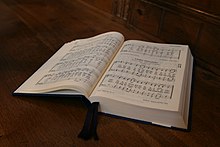Composition
In some musical genres, such as jazz and blues, even more freedom is given to the performer to engage in improvisation on a basic melodic, harmonic, or rhythmic framework. The greatest latitude is given to the performer in a style of performing called free improvisation, which is material that is spontaneously "thought of" (imagined) while being performed, not preconceived. Improvised music usually follows stylistic or genre conventions and even "fully composed" includes some freely chosen material. Composition does not always mean the use of notation, or the known sole authorship of one individual. Music can also be determined by describing a "process" that creates musical sounds. Examples of this range from wind chimes, through computer programs that select sounds. Music from random elements is called Aleatoric music, and is associated with such composers as John Cage, Morton Feldman, and Witold Lutosławski.
Music can be composed for repeated performance or it can be improvised: composed on the spot. The music can be performed entirely from memory, from a written system of musical notation, or some combination of both. Study of composition has traditionally been dominated by examination of methods and practice of Western classical music, but the definition of composition is broad enough to include spontaneously improvised works like those of free jazz performers and African drummers such as the Ewe drummers.


 00.12
00.12
 Jojo_deep
Jojo_deep


 Posted in:
Posted in: 

0 komentar:
Posting Komentar